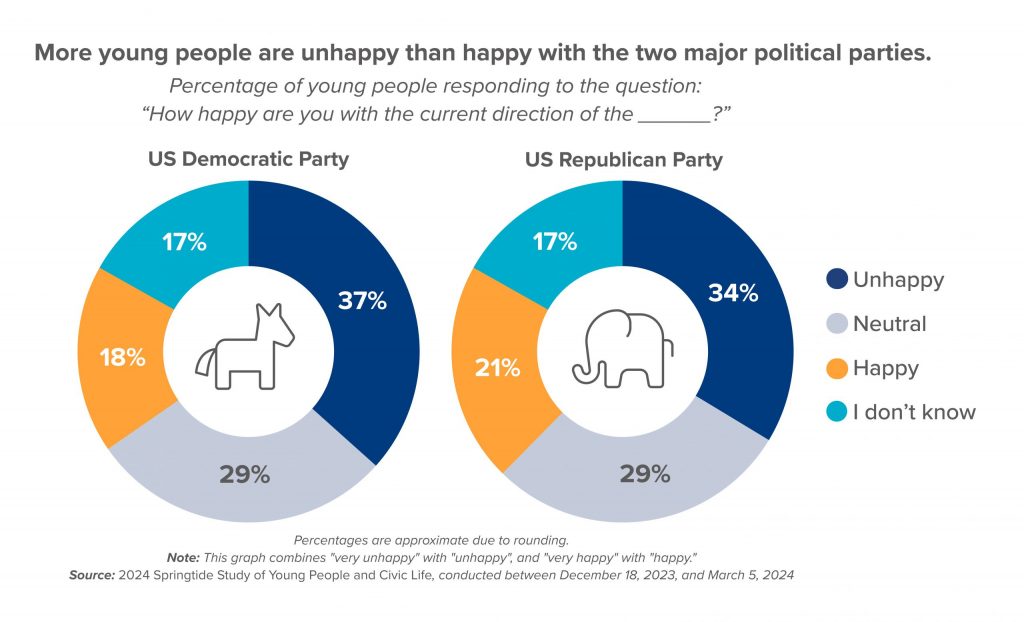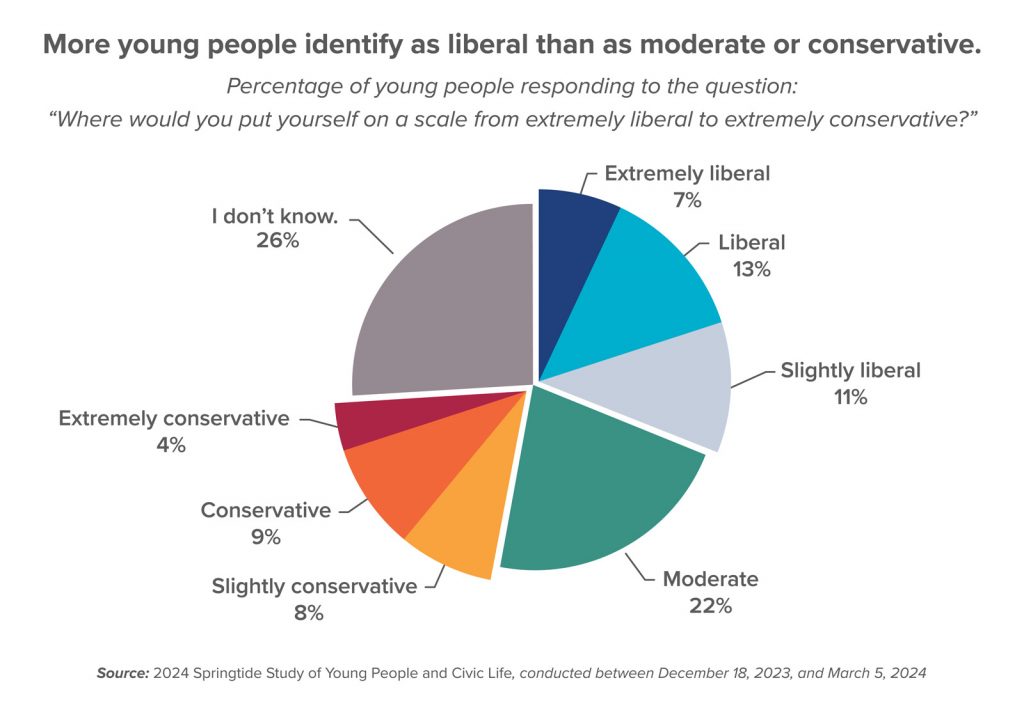
“It’s just too divisive”: Young People and Political Identities
Our newest report, Cultivating Care: How & Why Young People Participate in Civic Life, explores young people’s civic lives in the context of care—how they seek and gain knowledge, detangle complex identities from narrow labels, and engage in dialogue and action in ways that feel safe and productive. This post is the first in a series that showcases our latest findings, many of which are excerpted directly from the report. Read more about Cultivating Care here.
It’s difficult to look at a social media timeline, tune into a news broadcast, or listen to a podcast without at least one mention of the upcoming US election. Current national conversation is rife with sometimes heated discussions of values, ideals, policies, and the direction of our society. While such dialogue is nothing new, it does inform the environment in which young people are shaping their beliefs and opinions about politics and civic life.
At Springtide, we were curious about young people’s perspectives on these topics. Earlier this year, we asked thousands of young Americans ages 13 to 25 to tell us what they think about politics and how they engage politically. We heard stories of conflict and tales of love for neighbor, instances of avoidance and times of concern for one another, bouts of uncertainty and expressions of a deep desire to connect and respect across differences. In short, asking young people how they “do politics” led us to a better understanding of how to care.
How Young People Identify
In interviews, young people use words like “disaster” and “divisiveness” to describe politics in general. They often characterize politics and politicians as performative and emotional—even young people who claim high political engagement still express disillusionment with the system and its players.
Those experiences can create distance from the traditional political parties and affiliations. More than half of the young people we surveyed do not identify with either of the two major political parties. Their identities are instead shaped by a desire for flexibility and a focus on issue-based engagement rather than partisan affiliation.
As for why young people do not take on a political party identity, four themes emerge:
-
They dislike the political party system as a whole.
-
They feel rejected by political parties.
-
They see political parties as inauthentic.
-
They opt for flexibility that invites crosscutting in thinking and conversation.
Ava, 22, self-describes as “anti-party,” explaining that she’s opposed to the general idea of partisanship more than she is any particular party. She “just want[s] to help people” so that “the people have the power”—something that the current system missed. Rashida, 18, sees in parties little room for exception or disagreement; she also sees a general lack of respect, something she calls “a bit hypocritical.”
Some young people reject identifying with a party because they feel like the parties rejected them—or their loved ones—first. Vee, 19, is queer, Christian, and nonbinary, and says, “I don’t feel represented” by any party. Others feel that assuming a party identity closes off opportunities to dialogue across differences and examine issues broadly. To Cassandra, 20, a party identity feels like a “cage,” closing you off from hearing other viewpoints: “You’re going to seek that information only and not want to broaden and see what other people say.” Timón, 23, says that being “in the middle” means that “I’ll be able to make the right decision.”
Even among the 46% of young people who do identify as Democrat or Republican, party labels do not imply full agreement with party platforms. Like many Americans, young people tend to use issues like abortion, immigration, the economy, the environment, and gun laws to sort themselves into a party. Large numbers of young people, though, pair that label with words like lean (e.g., they lean left), or they add critical evaluations of their chosen party. Across all young people surveyed, less than a quarter say they are happy with the direction of the Democratic Party or Republican Party.

Lisa is a Republican but says, “Nowadays, it’s just too extreme for my liking.” Daisy, 19, a Republican, dislikes how her party is “harsh towards those who don’t believe the same thing,” something Caden, 18, a Republican, echoes: “It just becomes hating another side,” making them into an “enemy.” Olivia, 20, a Democrat, has “never been a blind ‘party’ person” and is “critical of the party as a whole.” Avery, 21, a Democrat, says that her party moves at “a snail’s pace” and could “push a little bit harder” on some issues.
When it comes to political ideologies, more young people identify as liberal (31%) than as moderate (22%) or conservative (21%). But large numbers of young people—26%—say that they “don’t know” where they fall on the ideological spectrum. This is especially true for young people under 18, one-third (32%) of whom “don’t know” their political ideology, compared to 21% among young adults. Young people ages 18 to 25 are more likely to identify with the “liberal” side of the ideological spectrum when compared to teenagers under 18 (64% versus 54%).

Young people who identify as more ideologically conservative describe the term conservative as an emphasis on the values of preservation, tradition, and stability, where those who identified as liberal defined progressive as forward, open-minded, and “looking to improve”.
Descriptions for ideological others are sometimes less generous. Young progressives see conservativism as “a mix of really dangerous nationalism and, sort of false belief in, this mythic American past” (Samuel, 18), “a lack of understanding when it comes to racial issues” (Marissa, 24), “conserving poor ideology” (Ava, 22), and “closed off” (Hayley, 21). Young conservatives and moderates critique progressivism as “in your face—always promoting what they think is right” (Daisy, 19), “overplayed . . . going too far” (Mae, 21), “attacking people that don’t resonate with their beliefs” (Lisa, 21), and “abandoning foundational things that maybe shouldn’t be abandoned” (Genevieve, 20).
Learn more about young people’s political identities and beliefs in our newest report, Cultivating Care: How & Why Young People Participate in Civic Life.



